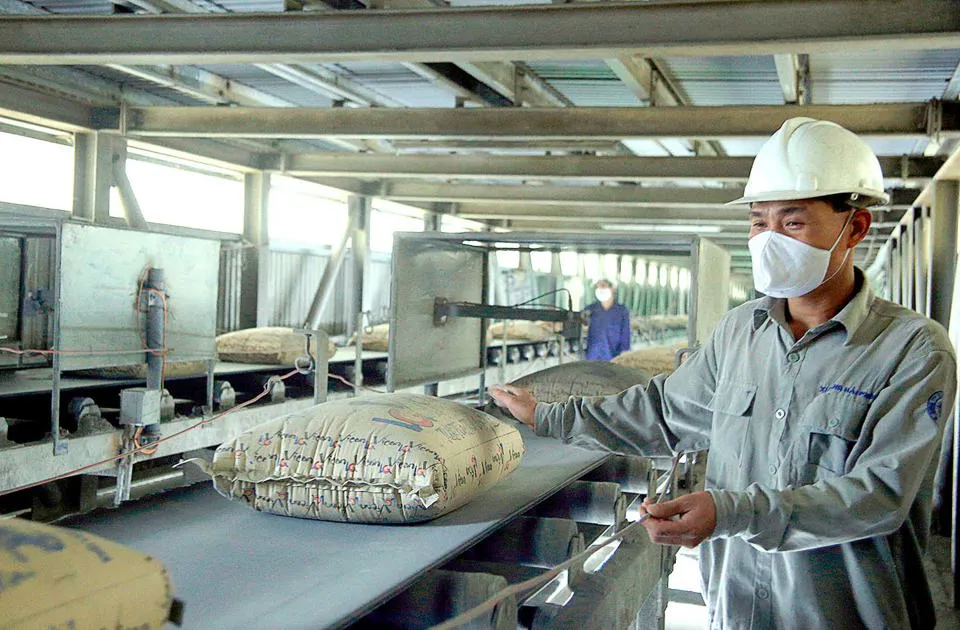S&P affirms Vietnam’s rating at BB+ with stable outlook
The country's attractiveness as a destination for FDI in Southeast Asia with a young, increasingly educated and competitive workforce should help to keep long-term development intact.
S&P Global Ratings on June 15 affirmed Vietnam's long-term foreign and local currency sovereign credit ratings at 'BB+' with a stable outlook, while the short-term ratings remain at 'B'.
"The stable outlook reflects our expectation that Vietnam's economy will recover over the next 24 months as global demand picks up and the country gradually addresses its domestic challenges. This should keep the government's debt repayment burden stable," the rating agency said in a statement.
| Cement production at Vincent Company. Photo: Viet Dung/The Hanoi Times |
S&P highlighted Vietnam's robust economic outlook, moderate debt levels, and sound external position. Vietnam's export manufacturing sector is likely to continue to attract substantial foreign direct investment (FDI) over the next few years, especially as companies seek to diversify their supply chains, it said.
Offsetting these strengths are Vietnam's modest GDP per capita, weaknesses in the banking sector, and an evolving institutional framework characterized by a centralized decision-making process and rigid bureaucracy, S&P said.
Regarding the country's economic situation this year, S&P suggested that economic growth could be around 5.5% this year, after an 8% expansion in 2022. This resulted from a modest growth rate of 3.3% in the first quarter of 2023.
Vietnam's export-driven economy relies on strong external demand. However, the normalization of demand for goods with the end of mobility restrictions and rising inflation and interest rates in end markets such as the US and Europe are constraining demand for Vietnamese exports.
On the services side, cross-border travel is recovering. However, Chinese tourists, who accounted for about one-third of Vietnam's total tourists in 2019, remain well below pre-pandemic levels.
Domestic demand is also weakening. Challenges in the property sector, including financing difficulties for real estate companies, high mortgage rates, and delays in the supply of land and housing projects, are weighing on domestic investment. The labor market is also weakening following layoffs in the manufacturing sector. This could dampen consumer spending.
However, S&P expects public investment to ramp up in the coming quarters from the state budget and the 2022 Program for Recovery and Development. This could help offset weaknesses. However, chronic delays in the execution of capital projects have historically hampered Vietnam's public spending and reduced support for growth.
From 2024, growth could still return to its long-term trend of 6.5-7.0%.
The expansion will bring Vietnam's GDP per capita to around US$4,300 in 2023. Trend growth, as measured by the country's 10-year weighted average growth of real GDP per capita, could be around 5.2%. This would still be well above the average of peers at similar income levels.
Risks to economic growth remain tilted to the downside, given Vietnam's dependence on external demand. A shallow US recession in the second half of the year and a weaker-than-expected recovery in China could keep demand subdued. Vietnam is also unlikely to resolve its domestic growth challenges in the near term.
Despite the immediate pressures, Vietnam's economic outlook remains robust, as S&P suggested. The economy is increasingly diversified, with a booming manufacturing sector largely financed by foreign direct investment. The country's attractiveness as a destination for FDI in Southeast Asia, with a young and increasingly educated and competitive workforce, should help sustain long-term development.
Vietnam's macroeconomic stability and well-developed logistics network for exports have supported the attractiveness of its manufacturing sector to global firms in the electronics, mobile phone, and textile industries. These FDI-oriented segments continue to drive domestic activity, with better employment opportunities and higher wages powering private consumption growth.
Over the years, Vietnam has also moved up the value chain, with increasing use of domestic suppliers. This is particularly evident in the textile and garment industry, where the ratio of imports to exports fell from 28% in 2007 to 18% in 2022.
Vietnam's government has generally delivered strong development results over the past decade.













